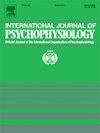Effects of unconscious tactile stimuli on autonomic nervous activity and afferent signal processing
IF 2.5
3区 心理学
Q3 NEUROSCIENCES
引用次数: 0
Abstract
Autonomic nervous system (ANS) is a mechanism that regulates our internal environment. In recent years, the interest in how tactile stimuli presented directly to the body affect ANS function and cortical processing in humans has been renewed. However, it is not yet clear how subtle tactile stimuli below the level of consciousness affect human heart rate and cortical processing. To examine this, subthreshold electrical stimuli were presented to the left forearm of 43 participants during an image-viewing task, and electrocardiogram (ECG) and electroencephalogram (EEG) data were collected. The changes in the R-wave interval of the ECG immediately after the subthreshold electrical presentation and heartbeat-evoked potential (HEP), the afferent signal processing of cardiac activity, were measured. The results showed that heart rate decelerated immediately after the presentation of subthreshold electrical stimuli. The HEP during stimulus presentation was amplified for participants with greater heart rate acceleration immediately after this deceleration. The magnitude of these effects depended on the type of the subthreshold tactile stimuli. The results suggest that even with subthreshold stimulation, the changes in autonomic activity associated with orienting response and related afferent signal processing differ depending on the clarity of the tactile stimuli.
无意识触觉刺激对自律神经活动和传入信号处理的影响
自律神经系统(ANS)是一种调节人体内部环境的机制。近年来,人们重新开始关注直接作用于人体的触觉刺激如何影响人体自律神经系统的功能和大脑皮层的处理过程。然而,目前还不清楚低于意识水平的微妙触觉刺激是如何影响人体心率和大脑皮层处理过程的。为了研究这一点,研究人员在 43 名参与者进行图像浏览任务时向其左前臂施加了阈下电刺激,并收集了心电图和脑电图数据。研究人员测量了阈下电刺激后心电图 R 波间期的变化以及心脏活动的传入信号处理--心跳诱发电位(HEP)。结果显示,阈下电刺激出现后,心率立即减慢。对于心率在减速后立即加速的参与者,刺激出现时的 HEP 会被放大。这些效应的大小取决于阈下触觉刺激的类型。结果表明,即使是阈下刺激,与定向反应和相关传入信号处理有关的自律神经活动的变化也因触觉刺激的清晰度而异。
本文章由计算机程序翻译,如有差异,请以英文原文为准。
求助全文
约1分钟内获得全文
求助全文
来源期刊
CiteScore
5.40
自引率
10.00%
发文量
177
审稿时长
3-8 weeks
期刊介绍:
The International Journal of Psychophysiology is the official journal of the International Organization of Psychophysiology, and provides a respected forum for the publication of high quality original contributions on all aspects of psychophysiology. The journal is interdisciplinary and aims to integrate the neurosciences and behavioral sciences. Empirical, theoretical, and review articles are encouraged in the following areas:
• Cerebral psychophysiology: including functional brain mapping and neuroimaging with Event-Related Potentials (ERPs), Positron Emission Tomography (PET), Functional Magnetic Resonance Imaging (fMRI) and Electroencephalographic studies.
• Autonomic functions: including bilateral electrodermal activity, pupillometry and blood volume changes.
• Cardiovascular Psychophysiology:including studies of blood pressure, cardiac functioning and respiration.
• Somatic psychophysiology: including muscle activity, eye movements and eye blinks.

 求助内容:
求助内容: 应助结果提醒方式:
应助结果提醒方式:


